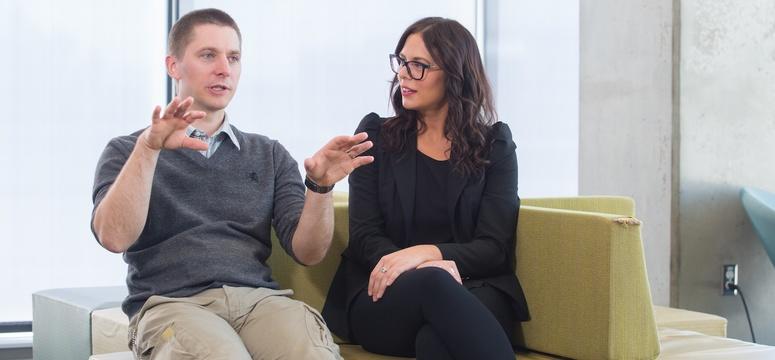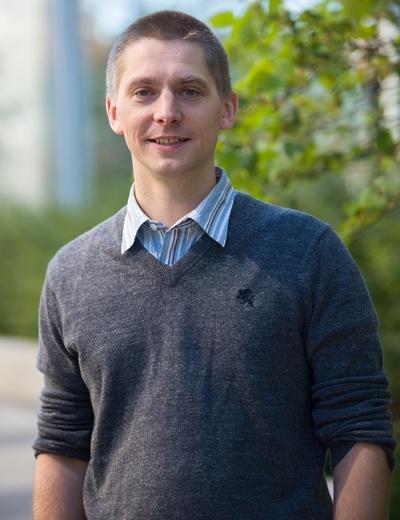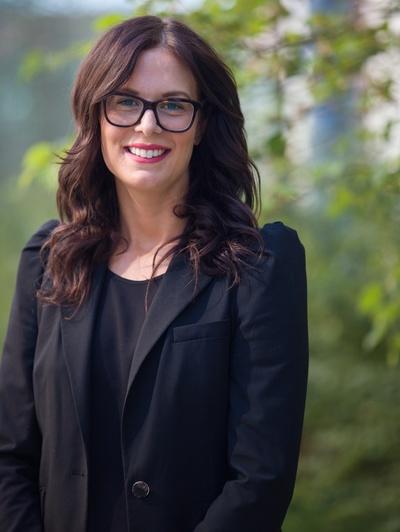
Both Manuel Kleiner, left, and Angela Alberga have been awarded the Banting Postdoctoral Fellowships
Riley Brandt, University of Calgary
Nov. 4, 2015

Both Manuel Kleiner, left, and Angela Alberga have been awarded the Banting Postdoctoral Fellowships
Riley Brandt, University of Calgary
Two University of Calgary postdoctoral scholars were awarded Banting Postdoctoral Fellowships by the Government of Canada this week.
Angela Alberga and Manuel Kleiner are both Eyes High postdoctoral scholars among the group of 70 top-ranked Canadian scholars to receive this prestigious fellowship. Alberga’s research explores weight bias in the health and education sectors, while Kleiner is examining the biochemistry of biological carbon capture.
“The Banting Fellowships recognize exceptionally talented recent PhD graduates — and the contributions that Manuel Kleiner and Angela Alberga are making to global issues like lowering our carbon footprint and ensuring social justice, shows very clearly the value the program brings to our university,” says Ed McCauley, vice-president (research).
“We are grateful to have earned the support from this competitive federal funding program that supports University of Calgary postdocs through the Bantings and graduate students through the Vanier Scholarships.”
The Banting Postdoctoral Fellowships program, named for Canadian Nobel Peace Prize winner Sir Frederick Banting, aims to attract and retain top-tier talent and position them for success as the research leaders of tomorrow. For Alberga and Kleiner, this translates to two years of funding, which will enable them to pursue international collaborations and position their innovative research on a global stage.

Kleiner is exploring how to speed up the process of capturing carbon dioxide to make biofuels.
Riley Brandt, University of Calgary
Improving metabolic pathway could speed up biological carbon capture process
Kleiner is attempting to forge an improved biochemical pathway that could speed up the process of capturing carbon dioxide from the atmosphere and using it to make biofuels.
“I’m investigating the metabolic pathway that occurs in microbes, plants, and algae, that is used to fix carbon dioxide into biomass,” says Kleiner. “Biomass is anything that grows — plants, algae, bacteria — and through carbon fixation, carbon dioxide ultimately solidifies and becomes those biological entities.”
Many people know carbon fixation by its textbook name, the Calvin cycle. "Carbon fixation is the basic process that everything needs — without carbon fixation there would be no biology,” says Kleiner.
Kleiner’s research has tremendous potential because of the key role carbon fixation plays in biology. “I’m looking for a pathway which is more energy efficient for carbon fixation than the known pathway, with the hope to actually improve the carbon fixation process,” he says. “If we find that this more efficient pathway works the way that we think it works, and it could be integrated, it would be a major breakthrough in all kinds of fields.”
Kleiner’s life-long concern with global climate change led him to pursue basic science that could have widespread impact. “I wanted to do something where I’m trying to contribute to solving a global problem,” he says.
Microbiologist and chemical engineer Marc Strous showed Kleiner that his lab at the University of Calgary would be the ideal place for Kleiner to make his contribution.
“We discussed the advantages of the Eyes High goals, and the Energy Innovations for Today and Tomorrow research theme,” Kleiner says. “There is a major effort going on and people are really invested. It’s a cross-campus approach.”
The cutting-edge infrastructure in Strous’ lab also helps advance Kleiner’s research. He is in charge of the lab’s proteomics mass spectrometer, which identifies the mass of proteins in a cell with extremely high accuracy. “Often mass spectrometers are only found in a core facility, but we have one right in our own laboratory. I’m hoping to develop collaborations on campus with others interested in using it,” he says.

Alberga is examining weight stigma and discrimination with the goal of implementing change in policy
Riley Brandt, University of Calgary